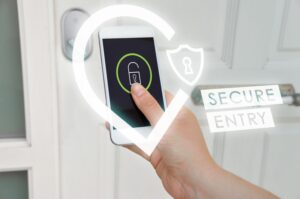 Decawave, the global leader in Ultra-Wideband (UWB) semiconductors, today announced the roadmap for its next generation UWB chipsets aimed at solving the global need for increased mobile transaction security. The new chipsets will be the world’s first to support the new IEEE 802.15.4z (4z) standard currently in the final stages of development.
Decawave, the global leader in Ultra-Wideband (UWB) semiconductors, today announced the roadmap for its next generation UWB chipsets aimed at solving the global need for increased mobile transaction security. The new chipsets will be the world’s first to support the new IEEE 802.15.4z (4z) standard currently in the final stages of development.
“Today’s mobile devices do an amazing job of combining multiple capabilities into a single device. However, as they increasingly act as the central hub for our lives, it is clear the next generation will need dramatically better security around digital wireless transactions to combat increasingly sophisticated attackers,” said Ciaran Connell, CEO and co-founder at Decawave. “Our new 4z based chips enable a step-change in security for home and auto access, financial transactions and many other uses across smart cities using smartphones, wearables and other connected devices.”
Connell continued, “Thanks to our strong position in standards and early investment in R&D, Decawave customers will be first to get access to the capabilities included in the new 4z standard as we will be able to quickly roll-out different variants of the new chipsets starting in 2019.”
Based on a new platform, the chipsets will offer up to 6x power consumption reduction over the current technology and will support the 8GHz band (Channel 9) enabling worldwide operation. Different derivatives will be available to address the needs of mobile, automotive, consumer and industrial customers.
The new 4z standard has been developed as a complement to the current Decawave driven 4a standard (802.15.4-2015). It meets the ever-increasing need for highly secure, high precision, location awareness and location services. Key among the applications enabled by the secure ranging technology in the 4z standard are highly secure mobile financial and access transactions and the ability to use precise location to combat malicious attacks that enable the hacking of wireless payments and the theft of modern vehicles.
Key additions in the 4z standard include:
- Totally secure ranging scheme thanks to a cyphered preamble and data frame
- The addition of higher data-rate modes up to 27Mbps with long range capability
- The backwards compatibility to the currently existing 15.4a standard
The building of the new 4z standard has been a joint, constructive and consensus driven effort actively involving industry leaders from across mobile, automotive and location services, with Decawave acting as a force for proposals and driving the consensus process with support from key players. The approval process for the 802.15.4z standard is expected to be completed during the course of 2019.
Come on. Decawave is using the HRP standard, this is a non sense in term of power consumption comparing to LRP.